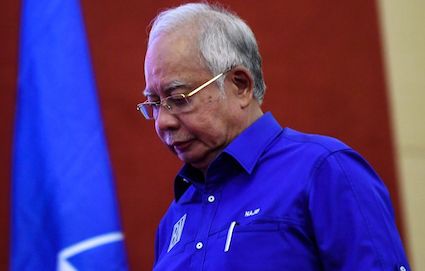For Najib, worst yet to come

Zainal Epi, Malay Mail Online
Tun Dr Mahathir Mohamad is about to create Malaysian history by becoming the prime minister for the second time, after nearly 16 years of absence from active politics, while his son, Datuk Seri Mukhriz Mahathir, is set to be made Kedah mentri besar, reversing his sacking in 2015.
In a short span of two years, Dr Mahathir turned the informal Pakatan Harapan pact from a rag-tag band into true giant killers, defeating the Barisan Nasional that he had once helped make formidable and — until today — seemingly invincible.
While all eyes are on Dr Mahathir as he prepares to be sworn in as the seventh prime minister, away from the spotlight, Datuk Seri Najib Razak is heading towards more turmoil and it remains to be seen if Umno will even allow the former prime minister to become BN’s Opposition leader.
Umno has already postponed its internal elections that must be held triennially and will have no recourse but to conduct one soon on pain of deregistration.
For Najib, there can be no worse circumstance under which to face the party. Virtually all its leaders were wiped out in the 14th general election and fewer than a quarter of Umno’s supreme council survived as Malaysians voted overwhelmingly to replace BN as the government.
He can expect the party’s over three million members, 146,000 of whom have direct voting rights in the party, to bay for blood over the massacre at the ballot boxes on May 9.
At the next Umno annual assembly, the same rules will no longer apply and the usual calls for delegates to unite behind leaders will likely fall on deaf ears as the Malay nationalist party comes to term with the Opposition label that it must now wear.
For a party that has never tasted defeat at the federal level in all the years since Merdeka, Umno and its surviving Barisan Nasional allies are, for the first time, on the outside looking in.
Without the largesse that kept members content, Najib can expect a stormy reception at the assembly and should not hope for the typical call for the party’s top to positions to go uncontested, which has been the norm despite the party amending its constitution to allow these to be more easily challenged.
If Tun Abdullah Ahmad Badawi was hounded from office after BN lost its traditional parliamentary supermajority in 2008, Najib should be under no illusions about what the leader who led the party to the ignominy of defeat can expect.
More worryingly for Umno’s top echelon, members may demand a bloodletting that goes beyond just the presidency.
From the level of public support that allowed Dr Mahathir’s pact to win the election, it is clear that even Umno members themselves voted against BN, so the resentment within the party is manifest.
Given that Umno has not held an internal election in the last three years and with clear vacancies at the top caused by the sacking of former deputy president Tan Sri Muhyiddin Yassin and the departure of former vice president Datuk Seri Shafie Apdal, members could take the opportunity to rejuvenate the party leadership.
It could also be a chance for the party to reinvent itself and prepare for the challenge still five years away, as the so-called warlords and division chiefs entertain a more humble approach to politics.
While it is unclear if Umno can or will remake itself to better appeal to an awakened electorate, there can be little doubt that the coming assembly will see an outpouring of anguish and frustration from members who felt their warnings went unheeded by their leaders.
Some feel they have been treated as non-existent, complaining that party leaders only began reaching out after Najib announced the dissolution of Parliament. But by then, it was already too late.
As Umno engages in deep introspection, it must explore whether delaying its internal polls for so long had caused it not to see issues and dissent while these could still be managed.
When he next faces his party men at Umno’s annual assembly, Najib is assured of sympathy, at least, from the 2,500 or so delegates representing the 192 divisions, but not compromise on the need for a changing of the guard.

